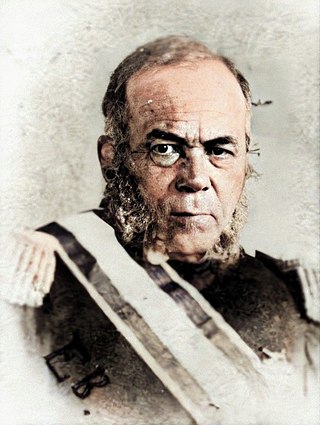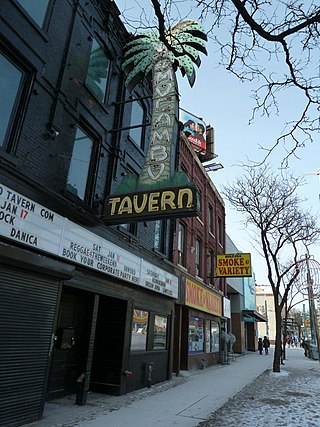
The Dominican Republic is a country located on the island of Hispaniola in the Greater Antilles archipelago of the Caribbean region. It occupies the eastern five-eighths of the island, which it shares with Haiti, making Hispaniola one of only two Caribbean islands, along with Saint Martin, that is shared by two sovereign states. The Dominican Republic is the second-largest nation in the Antilles by area at 48,671 square kilometers (18,792 sq mi), and third-largest by population, with approximately 10.7 million people, down from 10.8 million in 2020, of whom approximately 3.3 million live in the metropolitan area of Santo Domingo, the capital city. The official language of the country is Spanish.

Haiti, officially the Republic of Haiti, and formerly known as Hayti, is a country located on the island of Hispaniola in the Greater Antilles archipelago of the Caribbean Sea, east of Cuba and Jamaica, and south of The Bahamas and the Turks and Caicos Islands. It occupies the western three-eighths of the island which it shares with the Dominican Republic. To its south-west lies the small Navassa Island, which is claimed by Haiti but is disputed as a United States territory under federal administration. Haiti is 27,750 km2 (10,714 sq mi) in size, the third largest country in the Caribbean by area, and has an estimated population of 11.4 million, making it the most populous country in the Caribbean. The capital is Port-au-Prince.

Rafael Leónidas Trujillo Molina, nicknamed El Jefe, was a Dominican dictator who ruled the Dominican Republic from August 1930 until his assassination in May 1961. He served as president from 1930 to 1938 and again from 1942 to 1952, ruling for the rest of the time as an unelected military strongman under figurehead presidents. His rule of 31 years, known to Dominicans as the Trujillo Era, is considered one of the bloodiest and most corrupt regimes in the Western hemisphere, and centered around a personality cult of the ruling family. Trujillo's security forces, including the infamous SIM, were responsible for perhaps as many as 50,000 murders, including between 12,000 and 30,000 Haitians in the infamous Parsley massacre in 1937, which continues to affect Dominican-Haitian relations to this day.

The Missionaries of Charity is a Catholic centralised religious institute of consecrated life of Pontifical Right for women established in 1950 by Mother Teresa, now known in the Catholic Church as Saint Teresa of Calcutta. As of 2020, it consisted of 5,281 members religious sisters. Members of the order designate their affiliation using the order's initials, "M.C.". A member of the congregation must adhere to the vows of chastity, poverty, obedience, and the fourth vow, to give "wholehearted free service to the poorest of the poor." Today, the order consists of both contemplative and active branches in several countries.

Mary Teresa Bojaxhiu, MC, better known as Mother Teresa or Saint Mother Teresa of Calcutta, was an Albanian-Indian Catholic nun and the founder of the Missionaries of Charity. She was born Anjezë Gonxhe Bojaxhiu in Skopje, part of the Ottoman Empire at the time. At the age of 18, she moved to Ireland and then to India, where she lived most of her life. On 4 September 2016, she was canonised as Saint Teresa of Calcutta. The anniversary of her death, 5 September, is her feast day.

The Rio Group (G-Rio) was a permanent association of political consultation of Latin America and Caribbean countries, created in Rio de Janeiro, Brazil on December 18, 1986 with the purpose of creating a better political relationship among the countries. It was succeeded in 2011 by the Community of Latin American and Caribbean States

Pedro Santana y Familias, 1st Marquess of Las Carreras was a Dominican military commander and royalist politician who served as the president of the junta that had established the First Dominican Republic, a precursor to the position of the President of the Dominican Republic, and as the first President of the republic in the modern line of succession. A traditional royalist who was fond of the Monarchy of Spain and the Spanish Empire, he ruled as a governor-general, but effectively as an authoritarian dictator. During his life he enjoyed the title of "Libertador de la Patria."

The El Mocambo is a live music and entertainment venue in Toronto, Ontario. Located on Spadina Avenue, just south of College Street, the venue has played an important role in the development of popular music in Toronto since 1948. It is best known for the 1977 surprise show by The Rolling Stones, which became nationally notorious for the presence of then Prime Minister Pierre Trudeau's wife, Margaret Trudeau, who was partying with the Stones.

Love You Live is a double live album by the Rolling Stones, released in 1977. It is drawn from Tour of the Americas shows in the US in the summer of 1975, Tour of Europe shows in 1976 and performances from the El Mocambo nightclub concert venue in Toronto in 1977. It is the band's third official full-length live release and is dedicated to the memory of audio engineer Keith Harwood, who died in a car accident shortly before the album's release. It's also the band's first live album with Ronnie Wood.

Children of the Nations (COTN) is a Christian nonprofit organization that exists to provide care for orphaned and destitute children in poverty-stricken areas of the world. Operating in Malawi, Sierra Leone, the Dominican Republic, Uganda, and Haiti, COTN helps nearly 7,000 children on a daily basis. COTN's stated goal is to "Raise children who transform nations."
Americares is a global non-profit organization focused on health and development that responds to individuals affected by poverty, disaster, or crisis. The organization addresses poverty, disasters, or crises with medicine, medical supplies and health programs.

Solange Pierre, known as Sonia Pierre, was a human rights advocate in the Dominican Republic who worked to end antihaitianismo, which is discrimination against individuals of Haitian origin either born in Haiti or in the Dominican Republic. For this work, she won the 2006 Robert F. Kennedy Human Rights Award.

Sosúa is a beach town in the Puerto Plata province of the Dominican Republic. Located approximately 4 miles (6.4 km) from the Gregorio Luperón International Airport in San Felipe de Puerto Plata.

The Haitian occupation of Santo Domingo was the annexation and merger of then-independent Republic of Spanish Haiti into the Republic of Haiti, that lasted twenty-two years, from February 9, 1822 to February 27, 1844. While many Haitians view the invasion and occupation of Spanish Santo Domingo as a "unification" of the island designed to protect their country from re-enslavement via the Spanish side, Dominicans consider it as a forced military invasion and occupation. The Haitian occupation's suppression of Dominican culture, forceful redistribution of Dominican wealth, and strict policies based on labor led to growing resentment that culminated in a Dominican movement for national independence, which was attained in February 1844.

Casualties of the 2010 Haiti earthquake include both civilian and government officials, locals and foreigners – however the overwhelming majority of those killed and wounded in the quake were Haitian civilians. A number of public figures died in the earthquake, including government officials, clergy members, musicians, together with foreign civilian and military personnel working with the United Nations. On 15 January, the Red Cross estimated the death toll at between 45,000 and 50,000, however by 24 January, Communications Minister Marie-Laurence Jocelyn Lassegue said the death toll was over 150,000 in the Port-au-Prince metropolitan area alone. Haitian president René Préval reported on 27 January that "nearly 170,000" bodies had been counted.

The humanitarian responses by non-governmental organizations to the 2010 Haiti earthquake included many organisations, such as international, religious, and regionally based NGOs, which immediately pledged support in the aftermath of the 2010 Haiti earthquake. Besides a large multi-contingency contribution by national governments, NGOs contributed significantly to both on-the-ground rescue efforts and external solicitation of aid for the rescue efforts.

GlobalMedic is a non-sectarian humanitarian-aid non-governmental organization based in Etobicoke, Toronto, Ontario, Canada, and the operational arm of the David McAntony Gibson Foundation (DMGF), a registered Canadian charity. It provides disaster relief to large scale catastrophes around the world and also carries out humanitarian capacity building programs in post-conflict nations. Time magazine recognized the work of GlobalMedic in its 2010 Time 100 issue. Rahul Singh, a Toronto paramedic, founded the David McAntony Gibson Foundation in 1998 in honour of a best friend who lost his life the same year.

Dominican Republic–Haiti relations refers to the diplomatic relations between the Dominican Republic and the Republic of Haiti. Relations have long been hostile due to the substantial ethnic and cultural differences between the two nations and their sharing of the island of Hispaniola, part of the Greater Antilles archipelago in the Caribbean region. Living standards in the Dominican Republic are considerably higher than those in Haiti. The economy of the Dominican Republic is ten times larger than that of Haiti. The migration of impoverished Haitians and deep-set cultural differences have contributed to long-standing conflicts.
The Haitian minority of the Dominican Republic is the largest ethnic minority in the Dominican Republic since the early 20th century.

Caritas Internationalis is a confederation of 162 Catholic relief, development and social service organizations operating in over 200 countries and territories worldwide.


















